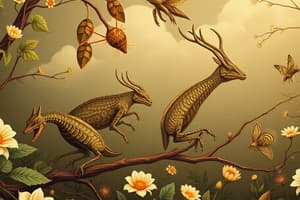Podcast
Questions and Answers
What are structures that are similar called?
What are structures that are similar called?
homologous
What is a characteristic that helps an organism survive called?
What is a characteristic that helps an organism survive called?
adaptation
What is it called when one species evolves into many?
What is it called when one species evolves into many?
adaptive radiation
What is the pattern of evolution where a species is stable for a long time and then rapidly changes?
What is the pattern of evolution where a species is stable for a long time and then rapidly changes?
What is the name of Darwin's book?
What is the name of Darwin's book?
What is the process by which evolution occurs?
What is the process by which evolution occurs?
What did turtles have that depended on the island they were from?
What did turtles have that depended on the island they were from?
What do we call a well-supported testable explanation?
What do we call a well-supported testable explanation?
What is it called when two species evolve together?
What is it called when two species evolve together?
Natural selection is also known as the survival of the what?
Natural selection is also known as the survival of the what?
What islands did Darwin visit?
What islands did Darwin visit?
What principle states that living species are descended from ancient ones?
What principle states that living species are descended from ancient ones?
What is the name of the ship that Darwin traveled on?
What is the name of the ship that Darwin traveled on?
What is it called when two unrelated organisms look alike?
What is it called when two unrelated organisms look alike?
What does the term diversity refer to?
What does the term diversity refer to?
What is it called when organisms disappear from the Earth?
What is it called when organisms disappear from the Earth?
Who proposed the theory of evolution by natural selection?
Who proposed the theory of evolution by natural selection?
What is the formation of new species called?
What is the formation of new species called?
What does evolution refer to?
What does evolution refer to?
What is required for new species to form?
What is required for new species to form?
What are the preserved remains of ancient organisms called?
What are the preserved remains of ancient organisms called?
What did finches have that depended on the island they were from?
What did finches have that depended on the island they were from?
What is the study of the Earth called?
What is the study of the Earth called?
What are structures that have no current function called?
What are structures that have no current function called?
Flashcards
Homologous Structures
Homologous Structures
Similar structures in different species, suggesting a common ancestor.
Adaptation
Adaptation
A trait that helps an organism survive and reproduce in its environment.
Adaptive Radiation
Adaptive Radiation
One species evolving into multiple forms to fill different niches.
Punctuated Equilibrium
Punctuated Equilibrium
Signup and view all the flashcards
Natural Selection
Natural Selection
Signup and view all the flashcards
Darwin's "The Origin of Species"
Darwin's "The Origin of Species"
Signup and view all the flashcards
Darwin
Darwin
Signup and view all the flashcards
Turtles
Turtles
Signup and view all the flashcards
Finches
Finches
Signup and view all the flashcards
Coevolution
Coevolution
Signup and view all the flashcards
Fittest
Fittest
Signup and view all the flashcards
Speciation
Speciation
Signup and view all the flashcards
Isolation
Isolation
Signup and view all the flashcards
Fossils
Fossils
Signup and view all the flashcards
Vestigial Structures
Vestigial Structures
Signup and view all the flashcards
Diversity
Diversity
Signup and view all the flashcards
Extinction
Extinction
Signup and view all the flashcards
Galapagos Islands
Galapagos Islands
Signup and view all the flashcards
Beagle
Beagle
Signup and view all the flashcards
Geology
Geology
Signup and view all the flashcards
Study Notes
Key Concepts in Evolution
- Homologous Structures: Similar structures in different species indicating a common ancestor.
- Adaptation: Traits that enhance survival and reproduction of organisms.
- Adaptive Radiation: Evolutionary process where one species evolves into multiple forms to adapt to various environments.
Patterns of Evolution
- Punctuated Equilibrium: Evolution occurs in long stable periods interrupted by brief, rapid changes.
- Natural Selection: Mechanism of evolution where organisms better adapted to their environment tend to survive and produce more offspring.
Influential Works and Figures
- Darwin's "The Origin of Species": Landmark book summarizing Darwin's theories on evolution and natural selection.
- Darwin: Proposed key theories of evolution, emphasizing natural selection.
Species and Their Adaptations
- Turtles: Displayed varied shell shapes as adaptations to different island environments.
- Finches: Exhibited differences in beak shapes based on their specific island habitats.
Ecological Interactions
- Coevolution: Process where two or more species influence each other's evolution through reciprocal adaptations.
Evolutionary Principles
- Fittest: Refers to individuals that are more likely to survive and reproduce, encapsulated in the phrase "survival of the fittest."
- Speciation: Process through which new species arise from existing species.
- Isolation: Necessary condition for speciation to occur, preventing gene flow between populations.
Geological Context
- Geology: Study of Earth's structure which provides context for evolution and the age of fossils.
Remnants and Evidence
- Fossils: Remains or traces of ancient organisms, essential for understanding evolutionary history.
- Vestigial Structures: Traits that are remnants from ancestral species that no longer serve a functional purpose.
Concepts of Diversity and Extinction
- Diversity: Refers to the variety of living organisms within a particular habitat or ecosystem.
- Extinction: The process through which species cease to exist on Earth.
Important Locations
- Galapagos Islands: Unique ecological settings that inspired Darwin's theories due to the presence of diverse species adapted to individual islands.
- Beagle: The ship that carried Darwin on his voyage where he made significant observations leading to his evolutionary theories.
Studying That Suits You
Use AI to generate personalized quizzes and flashcards to suit your learning preferences.




